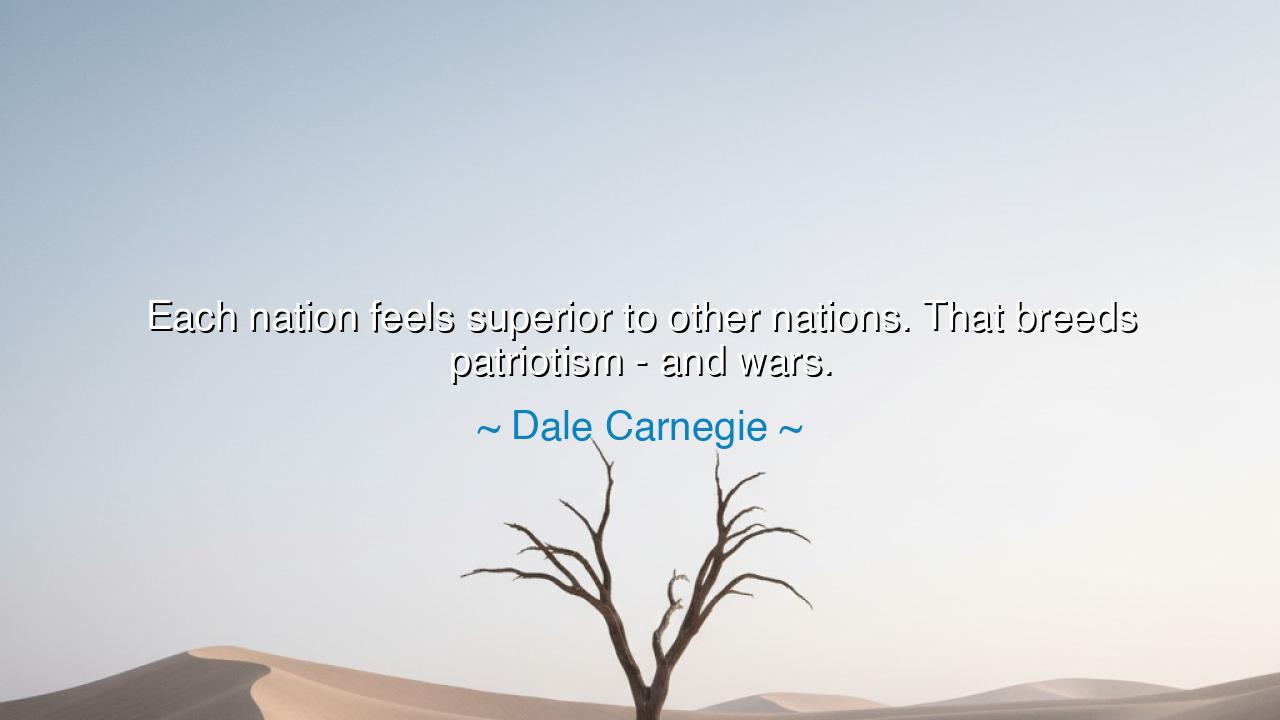
Each nation feels superior to other nations. That breeds






Dale Carnegie, the great teacher of human relations, once revealed a truth that rings like a warning bell through the ages: “Each nation feels superior to other nations. That breeds patriotism – and wars.” In this brief saying, he exposed both the root of pride and the seed of bloodshed. For when nations gaze upon themselves, they see only glory and strength; when they gaze upon their neighbors, they see only weakness or fault. Thus, pride becomes patriotism, and patriotism, twisted by arrogance, becomes the mother of conflict.
The meaning here is twofold. On one hand, patriotism arises from a people’s love of their own land, their culture, their heritage. This in itself is noble and natural. Yet, Carnegie warns that love often turns to vanity, and vanity to contempt. When nations begin to measure themselves against one another, not with humility but with pride, the bond of humanity is broken. They no longer see brothers and sisters across the borders, but rivals to outshine, enemies to conquer. And once that seed is planted, wars are never far behind.
History gives us countless examples of this dark progression. Consider the First World War. Each nation of Europe boasted of its strength, its culture, its destiny. The Germans believed in their rising might, the French in their endurance, the British in their empire, the Austrians in their authority. Each felt superior to the others, and each dressed that feeling in the cloak of patriotism. When the spark was struck in Sarajevo, pride and rivalry turned swiftly to slaughter. Millions perished, not because of necessity alone, but because each nation’s pride refused humility, and each mistook arrogance for love of country.
Yet Carnegie’s wisdom is not only a condemnation; it is also a mirror. He compels us to look into our own hearts. How often do we fall into the same delusion? How often do we speak of our nation’s greatness not as gratitude, but as boasting? How often do we turn patriotism into a weapon against others, rather than a bond of unity with our own? His warning is simple: beware of the patriotism that begins in superiority, for it ends in blood.
But let us not despise true patriotism. Love of one’s land can be pure, humble, and strengthening. A farmer who toils for his village, a soldier who guards his people, a teacher who preserves the culture of his ancestors—all are patriots without arrogance. It is when nations cease to love with humility and begin to exalt themselves above all others that their patriotism grows dangerous. For pride divides, but compassion unites; superiority breeds contempt, but humility breeds peace.
The lesson, then, is clear: if we would love our country rightly, we must do so without despising others. Let us teach our children to be proud of their heritage, but not blind to the worth of others’ heritage. Let us celebrate our culture, but not sneer at the cultures of our neighbors. True greatness is not found in boasting of superiority, but in service, compassion, and justice. A nation that loves itself without humility becomes a tyrant; a nation that loves itself with humility becomes a light.
Therefore, take this wisdom into your own life. Guard your heart against arrogance disguised as patriotism. When you speak of your country’s greatness, let it be with gratitude, not contempt for others. When you act in your community, let it be in service, not pride. And when voices around you stir hatred by exalting superiority, remember Carnegie’s warning: such pride breeds wars.
So let us end where we began: “Each nation feels superior to other nations. That breeds patriotism – and wars.” Hold this truth as both caution and call. Love your country deeply, but love it humbly. For only then can patriotism build peace rather than destruction, and only then can nations walk side by side as equals beneath the same sun.






AAdministratorAdministrator
Welcome, honored guests. Please leave a comment, we will respond soon